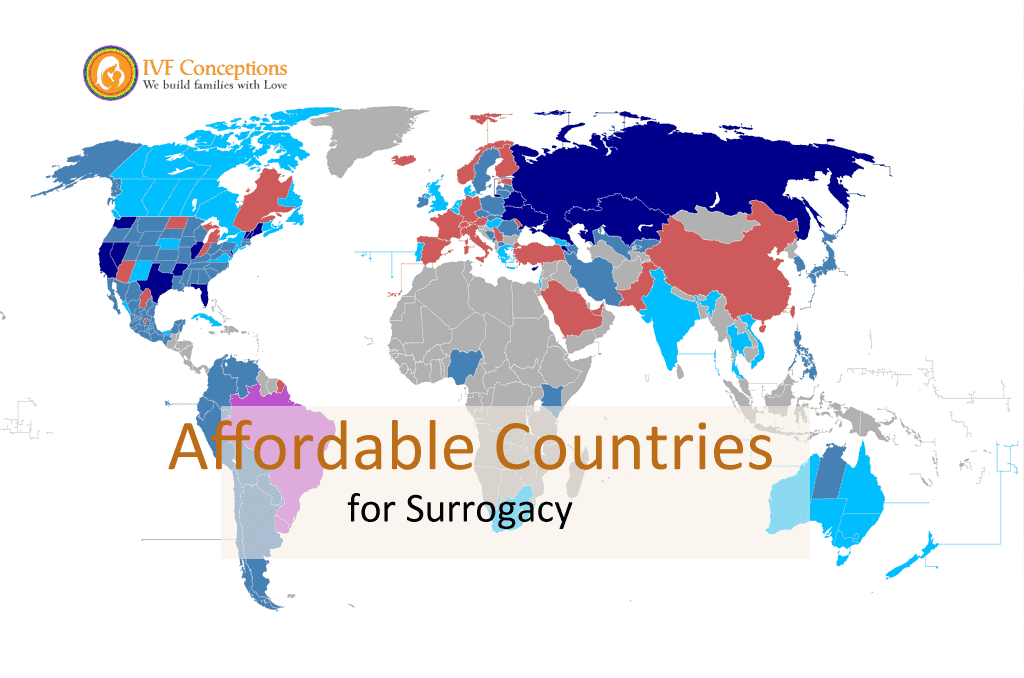What is the Surrogacy Legal Process? A Complete Guide for Intended Parents
Surrogacy is an incredible opportunity for individuals and couples to realize their dream of parenthood when traditional methods of conception aren’t possible. However, navigating the surrogacy journey isn’t just about selecting a surrogate or undergoing medical procedures—there’s also a critical legal process that ensures both the intended parents and the surrogate are protected. Understanding the surrogacy legal process is key to ensuring a smooth experience for all parties involved.
In this guide, we will explore the various legal steps, contracts, and requirements that intended parents must know before embarking on their surrogacy journey.
International surrogacy laws vary from country to country and state-wise as well. Knowing the legal situations of places where you do surrogacy will make it a hassle-free experience. Your surrogacy agency can help you know and understand the legal surrogacy countries and your reproductive attorney can draft surrogacy agreements accordingly.
Get in touch for FREE SURROGACY CONSULTING:
Mobile: +91-8800481100 ( WhatsApp, Line, Viber)
Email: neelam@ivfconceptions.com
Understanding the Surrogacy Legal Process
The legal aspects of surrogacy are essential to ensure that the intended parents are recognized as the legal guardians of the child and that the rights of the surrogate are protected. The legal process typically includes drafting contracts, securing parental rights, and navigating international laws for cross-border surrogacy.
Two Types of Surrogacy
- Traditional Surrogacy: The surrogate mother uses her egg, making her the biological mother of the child. This type of surrogacy can be legally complex due to potential custody issues.
- Gestational Surrogacy: The surrogate has no biological connection to the child as the embryo is created through IVF using the intended parents’ or donors’ egg and sperm. This is the more common and legally straightforward type of surrogacy.

Key Steps in the Surrogacy Legal Process
1. Legal Consultation and Counseling
The first step in the surrogacy legal process is to seek legal consultation from an experienced surrogacy attorney. It’s crucial that both the intended parents and the surrogate understand their legal rights and responsibilities before any agreements are made. Intended parents should work with an attorney who specializes in reproductive and surrogacy law to guide them through the process.
Legal counsel can help with:
- Reviewing surrogacy laws in the intended parents’ and surrogate’s country or state.
- Identifying potential risks or legal barriers.
- Explaining international surrogacy laws if applicable.
2. Drafting the Surrogacy Agreement (Contract)
Once a surrogate is selected, a surrogacy agreement or contract must be created. This is a legally binding document that outlines the rights, responsibilities, and expectations of both the intended parents and the surrogate throughout the pregnancy and after the child’s birth.
Key components of a surrogacy contract include:
- Parental Rights: Establishing that the intended parents will be the legal parents upon the birth of the child.
- Surrogate Compensation: Detailing the financial arrangement, including base compensation, medical expenses, and additional allowances (e.g., for multiple births, medical complications).
- Medical Decisions: Clarifying who will make medical decisions regarding the pregnancy and any prenatal treatments.
- Termination of Pregnancy: Addressing sensitive topics like selective reduction and abortion, including the surrogate’s and intended parents’ rights in such cases.
- Post-Birth Contact: Defining the level of communication and relationship between the surrogate and the intended parents after the birth.
Both parties must have independent legal representation to ensure that their individual rights and interests are protected.
3. Establishing Parental Rights
One of the most critical parts of the surrogacy legal process is securing legal parentage for the intended parents. This step ensures that the intended parents are recognized as the legal guardians of the child from birth.
Methods of establishing parental rights include:
- Pre-Birth Orders (PBOs): In some regions, intended parents can obtain a pre-birth order, which is a legal document stating that they are the legal parents of the child, even before birth. This ensures that the intended parents’ names are placed on the birth certificate immediately.
- Post-Birth Orders: In regions where pre-birth orders are not possible, a post-birth order can be obtained after the child is born. This grants the intended parents legal parentage once the baby is delivered.
- Adoption: In cases where the intended parents are not genetically related to the child (e.g., when donor eggs or sperm are used), an adoption process may be required to legally transfer parental rights from the surrogate to the intended parents.
Note: The legal parentage process varies significantly depending on the country or state in which the surrogacy takes place. In some cases, surrogacy contracts may not be legally recognized, requiring adoption proceedings to be initiated.
More related topics:
Legal surrogacy countries- International surrogacy
 What is the Surrogacy Legal Process:
What is the Surrogacy Legal Process:
There are three parts to the legal process of surrogacy:
- The contract of surrogacy,
- Pre-birth order during the surrogacy,
- Post-birth legal procedures or adoption contracts.
Surrogacy Contract
Before the birth of the child or even before the embryo transfer, the gestational surrogate mother and the intended parents need to work with the attorney to draft and negotiate the surrogacy agreement. There are two significant requirements for major legal issues.
- Social Requirement – The agreement will make sure the social responsibilities intended parents have to perform while taking care of the surrogate. The responsibilities will apply to the surrogate mother as well She needs to make sure to avoid tobacco and alcohol during her surrogacy process.
The other kind of social responsibilities include whether someone will accompany the gestational carrier on key prenatal appointments and who will accompany her at these appointments.
- Finances – Both the intended parents and the surrogate will have their legal attorney. They will negotiate the surrogate’s base compensation as well as other surrogacy-related costs that must be included in the surrogacy contract like maternity clothing. Surrogate mother rights and Parental rights should be well protected.
The surrogacy contract will also include the space for any unforeseen emergency and complications.
The course of a pregnancy and a surrogacy arrangement can be affected by many factors. Working with an experienced surrogacy attorney is essential to drafting a detailed agreement covering every possible outcome.
If you are working with a surrogacy agency, your expert will probably be able to coordinate your legal representation. However, the American Academy of Assisted Reproductive Technology Attorneys (AAARTA) offers a directory of legal surrogacy experts if you are looking for an independent lawyer to assist you in drafting your surrogacy agreement.
Pre-Birth Order
The next step in the legal process of surrogacy is to establish the intended parents as the legal parents of the child. This process differs from nation to nation and within the country as well.
Most surrogacy-friendly states allow the intended parents to work with their legal advisor and file for a pre-birth order. The pre-birth order facilitates the post-birth order and enables the baby to be discharged to the intended parents after birth from the hospital.
The requirement for filing the pre-birth order varies from state to state. In general, the intended parents will be required to work on the following paperwork –
- Social documents are prepared for the surrogacy for both the intended parents and the surrogate.
- Papers were signed by the physician who did the embryo transfer to the surrogate.
- Paperwork signed by the surrogate family that they do not wish to have any right over the child once he or she is born.
Typically, the attorney can start working into the pre-birth order when the surrogate is seven months pregnant. When a pre-birth order is submitted, the only documentation required to finalize surrogacy after birth is a document signed by the surrogate and her partner acknowledging that they are not the child’s legal parents, as well as documentation from the expected parents saying that they will accept the child’s custody.
 Post-birth legal processes or the adoption
Post-birth legal processes or the adoption
In a few cases, additional legal steps are needed to be followed after the baby is born via the surrogacy process. This is mainly in the case where both of the intended parents are genetically not linked to the child.
The additional process of adoption has to be followed when only one parent’s genetic material is involved. This means to create the embryos either an egg donor or a sperm donor is used.
In both cases, the husband may adopt the wife’s legal child or the wife can adopt the husband’s legitimate child. In both, the adoption of the child is important if both want to have a full legal right to the child.
Depending on the state laws, single parents or same-sex couples may need to follow second-parent adoption instead of stepparent adoption.
If the intended parents completed an embryo adoption and none of them is genetically related to the child, then they have to perform the full adoption before transferring the child’s legal rights to the intended parents.
During the adoption of surrogacy cases, the intended parents must always comply with state laws. Your attorney will further guide you about how these processes have to take place. Nonetheless, for single fathers or gay couples, surrogacy laws are more restrictive.

Legal Considerations for International Surrogacy
Many intended parents choose international surrogacy as a more affordable or legally viable option. However, international surrogacy introduces a host of legal complexities, particularly concerning citizenship, immigration, and the recognition of parental rights.
Key legal challenges for international surrogacy:
- Citizenship and Passport for the Baby: Intended parents must navigate the process of obtaining citizenship for their baby, which may differ depending on the surrogacy destination and the intended parents’ home country.
- Exit Visa for the Baby: In many cases, the baby will need an exit visa to leave the country where the surrogate gave birth. This can involve additional legal documentation and may take time to process.
- Parental Rights Recognition: Not all countries automatically recognize parental rights established in another jurisdiction. Intended parents may need to go through additional legal steps to have their parentage recognized in their home country.
Working with legal professionals who specialize in cross-border surrogacy is essential to avoid legal complications during and after the surrogacy process.
The Importance of Working with a Surrogacy Attorney
The surrogacy legal process is highly specialized, and it’s vital to work with an attorney experienced in reproductive law. A knowledgeable attorney can:
- Draft a legally sound surrogacy agreement.
- Help secure parental rights through pre- or post-birth orders.
- Assist in navigating international surrogacy legalities.
- Provide protection for both intended parents and surrogates throughout the journey.
Failing to follow proper legal procedures can result in devastating consequences, such as the intended parents not being recognized as the legal parents of their child, or disputes arising over custody or compensation.
Understanding Surrogacy Laws by Country
Surrogacy laws vary significantly around the world, making it crucial for intended parents to understand the legal landscape in the country they choose for surrogacy. Here’s a quick overview of surrogacy laws in some of the most popular surrogacy destinations:
|
Country |
Surrogacy Legal Status |
|
United States |
Surrogacy laws vary by state. Some states, like California, are very surrogacy-friendly, allowing both traditional and gestational surrogacy, while others restrict or ban the practice. |
|
Canada |
Altruistic surrogacy (where the surrogate is compensated only for expenses) is legal, but commercial surrogacy is prohibited. |
|
Ukraine |
Ukraine allows commercial gestational surrogacy for heterosexual couples, with clear legal frameworks in place. Same-sex couples and single parents cannot pursue surrogacy. |
|
India |
Surrogacy is allowed for Indian nationals only, and international surrogacy has been banned since 2015. |
|
Georgia |
Georgia has legalized gestational surrogacy for heterosexual married couples. The intended parents’ names are placed directly on the birth certificate. |
|
Mexico |
Surrogacy laws vary by state. Some states allow surrogacy, but international surrogacy laws are still developing and can be complex. |
Understanding the legal framework of surrogacy in each country is crucial before making any decisions. Intended parents must ensure that their parental rights will be recognized both in the country of birth and in their home country.
Conclusion
Surrogacy offers a path to parenthood for many who face fertility challenges, but it is essential to understand the legal process to ensure that both the intended parents and surrogates are protected.
From drafting a legally binding contract to securing parental rights, every step of the surrogacy legal process requires careful attention and professional guidance.
Working with an experienced surrogacy attorney is crucial for navigating the complex legal landscape, ensuring a smooth process, and avoiding any legal pitfalls. By understanding the surrogacy legal process, intended parents can embark on their journey w
Therefore, the surrogacy process is a complex legal procedure that can be both mentally and emotionally challenging. On top of that, each country and state has its own surrogacy laws to consider.
But having a baby is a joyous moment for any would-be parents. Holding the child for the first time and time will melt away all the struggles parents have during the surrogacy process.
If you’d like to learn more about IVF, Egg Donation, or surrogacy services globally, check out the rest of our website at IVF Conceptions.
Get in touch for FREE SURROGACY CONSULTING:
Mobile: +91-8800481100 ( WhatsApp, Line, Viber)
Email: neelam@ivfconceptions.com
 FAQs About Surrogacy Legal Process
FAQs About Surrogacy Legal Process
Certainly, here are the answers to your questions with the numbers removed:
What is the surrogacy legal process?
The surrogacy legal process involves the legal steps and requirements associated with surrogacy arrangements. It includes drafting and executing surrogacy contracts, determining parental rights, and ensuring compliance with state or country-specific surrogacy laws.
How does surrogacy work legally?
Surrogacy works legally by establishing a legal framework that defines the rights and responsibilities of all parties involved, including intended parents, surrogates, and any donors. This typically involves drafting a surrogacy contract and following applicable laws and regulations.
What are the legal requirements for surrogacy?
Legal requirements for surrogacy vary by jurisdiction but often include age and health requirements for surrogates, background checks, and the need for a legally enforceable surrogacy agreement. It’s essential to consult with a surrogacy lawyer to understand the specific requirements in your area.
Are surrogacy contracts legally binding?
Surrogacy contracts are generally legally binding, but their enforceability can vary by jurisdiction. It’s crucial to work with a knowledgeable surrogacy attorney to ensure that the contract complies with local laws and is legally enforceable.
What is the role of a surrogacy lawyer?
A surrogacy lawyer plays a crucial role in facilitating surrogacy arrangements. They draft surrogacy contracts, provide legal guidance, ensure compliance with laws, and represent the interests of their clients (intended parents or surrogates) throughout the process.
How long does the surrogacy legal process take?
The duration of the surrogacy legal process can vary significantly depending on factors such as location, legal requirements, and individual circumstances. On average, it can take several weeks to several months to complete the legal steps.
Can international couples pursue surrogacy legally?
International couples can pursue surrogacy legally, but the legality and requirements may differ from one country to another. Some countries have specific laws regulating international surrogacy, while others may have restrictions or prohibitions.
What are the potential legal issues in surrogacy?
Potential legal issues in surrogacy may include disputes over parental rights, breach of surrogacy contracts, conflicts between parties, and compliance with changing surrogacy laws. Addressing these issues requires careful legal planning.
Do surrogates have legal rights?
Surrogates typically have legal rights outlined in the surrogacy contract. These rights may include compensation, medical decisions, and confidentiality. The specifics of surrogates’ rights can vary by jurisdiction and the terms of the contract.
How do parental rights transfer in surrogacy?
Parental rights in surrogacy usually transfer from the surrogate to the intended parents through legal processes such as a pre-birth order or adoption, depending on local laws. These processes ensure that the intended parents become the legal parents of the child.
What is the cost of legal aspects of surrogacy?
The cost of legal aspects of surrogacy in the USA is from $10,000 to $15,000 and can vary widely, depending on factors such as location, complexity of the case, and the services of the surrogacy attorney. It’s essential to budget for legal fees as part of the overall surrogacy expenses.
How can I find a reputable surrogacy attorney?
To find a reputable surrogacy attorney, consider seeking referrals from surrogacy agencies, support groups, or fertility clinics. Research their experience in surrogacy law, reviews from previous clients, and their understanding of local surrogacy regulations. It’s crucial to choose an attorney with expertise in surrogacy cases.


 What is the Surrogacy Legal Process:
What is the Surrogacy Legal Process: Post-birth legal processes or the adoption
Post-birth legal processes or the adoption FAQs About Surrogacy Legal Process
FAQs About Surrogacy Legal Process